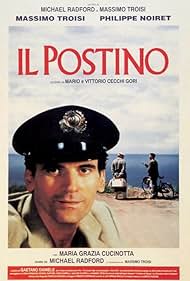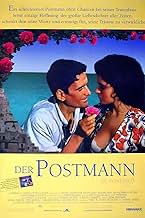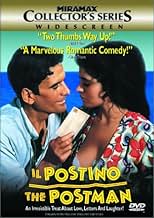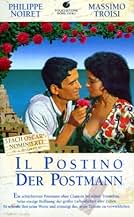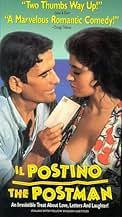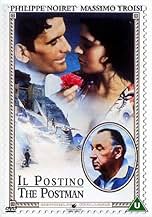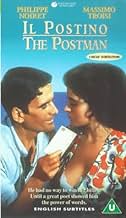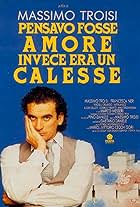A simple Italian postman learns to love poetry while delivering mail to a famous poet, and then uses this to woo local beauty Beatrice.A simple Italian postman learns to love poetry while delivering mail to a famous poet, and then uses this to woo local beauty Beatrice.A simple Italian postman learns to love poetry while delivering mail to a famous poet, and then uses this to woo local beauty Beatrice.
- Won 1 Oscar
- 31 wins & 20 nominations total
Calogero Azzaretto
- Bookseller
- (uncredited)
Simona Caparrini
- Elsa Morante
- (uncredited)
Angelo Casadei
- Cinema Spectator
- (uncredited)
Chuck Riley
- Narrator of Theatrical Trailer
- (voice)
- (uncredited)
Featured reviews
A beautiful movie that does an excellent job bringing to life Neruda's love poems and how they touch the life of a simpleton postman. It inspires in one, a spiritual and sensual love for poetry. The music is intricately woven into the fabric of the story, and is surely a high point in the movie. Great cinematography, matched frame by frame with the splendid acting, especially that of Massimo Troisi and Philippe Noiret. Watch this movie if you are disillusioned with the notion of romance, and need some succour.
The movie once again reinforces my admiration for the Italian film-makers. What amazes me is their simplicity in relating a tale, and how subtly pathos is displayed in their movies. This is also evidenced in "Life is Beautiful" and "The Bicycle Thief".
The movie once again reinforces my admiration for the Italian film-makers. What amazes me is their simplicity in relating a tale, and how subtly pathos is displayed in their movies. This is also evidenced in "Life is Beautiful" and "The Bicycle Thief".
"Il Postino" is a movie that received oodles of critical acclaim upon its release in 1994. While I don't think it was as good as advertised, I understand why it received such praise. In a movie world that is filled with dry and unamusing romance stories, "Il Postino" is a relatively lush and beautiful tale.
The plot is fairly simple but loaded with subtleties that allow, even encourage, multiple viewings. Mario (Massimo Troisi) longs for something more than his simple fisherman life on an Italian island, so he takes a small job as a postman, delivering mail to famed romantic poet Pablo Neruda (Phillipe Noiret), who is living in exile on the same island. Over time, they develop a relationship that is based on Neruda aiding Mario in wooing his beloved Beatrice (Maria Grazia Cucinotta).
The final act is where the film makes the leap from well-made standard fare to something greater. With a couple plausible plot developments, characters and relationships are deepened beyond a basic love story, to a place that accents everything that happens leading up to that point. I can't say much else without giving things away, but stick with the movie to the end, even if you're dragging midway through.
As you might expect from an Italian film, "Il Postino" has a very European feel. The passion of Italy is present throughout, explained through lifestyles, literal and metaphorical imagery, and the emotions of the characters. The setting is far from the bustling dollar-driven society in which Americans dwell, and a movie like this wouldn't get made in America, because the cultures are drastically different.
The film's star, Massimo Troisi, is excellent. He embodies everyman qualities exceptionally, similar to Tom Hanks, yet with more...something. Soul perhaps? He, like the entire film, is just more European, and I hope you understand what I mean by that. Noiret portrays Neruda perfectly, expressing his romantic ways through both words and actions. Everyone else is very good, although no one stands out; the overall anonymity of the cast aids the viewer in establishing culture as well.
The cinematography and the scenery it presents is often breathtaking, although not in the sweeping manner of something like The Lord of the Rings. Rather, cinematographer Franco Di Giacomo wisely chose to let the pictures speak for themselves. The elegant cliffs, white-capped waves, and rolling topography of the island gently yet firmly frame and support the story. A straight-forward tale should have suitable pictures, and "Il Postino" meets that requirement.
The film is touted as a romantic comedy, and it is, although not in the traditional sense. The comedy isn't slapstick and won't elicit bushels of laughter. But there is an underlying sense of humor laced through the whole movie, often in simple movements, tasks, or occurrences.
All of this combines to present something like a fairy tale replete with Italian heart and soul. "Il Postino" won't blow you away, but its tender lessons about life, love, and friendship will stick with you for some time, urging another viewing.
Bottom Line: A very European romance that is better than most anything Hollywood can conjure up. 8/10.
(If you like the film, get the Collector's Edition DVD; it's quite good.)
The plot is fairly simple but loaded with subtleties that allow, even encourage, multiple viewings. Mario (Massimo Troisi) longs for something more than his simple fisherman life on an Italian island, so he takes a small job as a postman, delivering mail to famed romantic poet Pablo Neruda (Phillipe Noiret), who is living in exile on the same island. Over time, they develop a relationship that is based on Neruda aiding Mario in wooing his beloved Beatrice (Maria Grazia Cucinotta).
The final act is where the film makes the leap from well-made standard fare to something greater. With a couple plausible plot developments, characters and relationships are deepened beyond a basic love story, to a place that accents everything that happens leading up to that point. I can't say much else without giving things away, but stick with the movie to the end, even if you're dragging midway through.
As you might expect from an Italian film, "Il Postino" has a very European feel. The passion of Italy is present throughout, explained through lifestyles, literal and metaphorical imagery, and the emotions of the characters. The setting is far from the bustling dollar-driven society in which Americans dwell, and a movie like this wouldn't get made in America, because the cultures are drastically different.
The film's star, Massimo Troisi, is excellent. He embodies everyman qualities exceptionally, similar to Tom Hanks, yet with more...something. Soul perhaps? He, like the entire film, is just more European, and I hope you understand what I mean by that. Noiret portrays Neruda perfectly, expressing his romantic ways through both words and actions. Everyone else is very good, although no one stands out; the overall anonymity of the cast aids the viewer in establishing culture as well.
The cinematography and the scenery it presents is often breathtaking, although not in the sweeping manner of something like The Lord of the Rings. Rather, cinematographer Franco Di Giacomo wisely chose to let the pictures speak for themselves. The elegant cliffs, white-capped waves, and rolling topography of the island gently yet firmly frame and support the story. A straight-forward tale should have suitable pictures, and "Il Postino" meets that requirement.
The film is touted as a romantic comedy, and it is, although not in the traditional sense. The comedy isn't slapstick and won't elicit bushels of laughter. But there is an underlying sense of humor laced through the whole movie, often in simple movements, tasks, or occurrences.
All of this combines to present something like a fairy tale replete with Italian heart and soul. "Il Postino" won't blow you away, but its tender lessons about life, love, and friendship will stick with you for some time, urging another viewing.
Bottom Line: A very European romance that is better than most anything Hollywood can conjure up. 8/10.
(If you like the film, get the Collector's Edition DVD; it's quite good.)
Mario takes up the job of postman on a small Italian island. The island has a new resident, the famed exiled Chilean poet Pablo Neruda, and he is receiving heaps of mail (mostly from women, to Mario's fascination). Mario strikes up a friendship with Neruda, who helps the not-overly-literate Mario develop his writing skills and appreciate poetry and prose. Then Mario meets a beautiful woman in the village and his new-found poetic skills are put to the test.
Great film. Wonderfully warm and charming, with a mellow style that is very engaging. Sweet plot that develops at just the right pace. The discussions between Neruda and Mario are a wonderful insight into creativity and how art is formed. The way Mario develops his creative side is also great to witness.
It does falter a bit in the third quarter or so. A certain point, about halfway through the movie, felt like a natural ending to the movie so it was difficult for the writers to develop the plot from such a high. Not that it was dull from that point on, it just didn't have quite the same ability to enthral. The ending is quite emotional though.
Great performances all round, especially by Massimo Troisi as Mario. He would go on to get a Best Leading Actor Oscar nomination for his efforts. Troisi also co-wrote the film and received a Best Adapted Screenplay nomination. Sadly, he never saw the fruits of his labours as he died of a heart attack 12 hours after filming ended.
All in all Il Postino received 5 nominations at the 1996 Oscars, including for Best Picture and Best Director, and ended up winning one, for best score.
Great film. Wonderfully warm and charming, with a mellow style that is very engaging. Sweet plot that develops at just the right pace. The discussions between Neruda and Mario are a wonderful insight into creativity and how art is formed. The way Mario develops his creative side is also great to witness.
It does falter a bit in the third quarter or so. A certain point, about halfway through the movie, felt like a natural ending to the movie so it was difficult for the writers to develop the plot from such a high. Not that it was dull from that point on, it just didn't have quite the same ability to enthral. The ending is quite emotional though.
Great performances all round, especially by Massimo Troisi as Mario. He would go on to get a Best Leading Actor Oscar nomination for his efforts. Troisi also co-wrote the film and received a Best Adapted Screenplay nomination. Sadly, he never saw the fruits of his labours as he died of a heart attack 12 hours after filming ended.
All in all Il Postino received 5 nominations at the 1996 Oscars, including for Best Picture and Best Director, and ended up winning one, for best score.
Set in the early 1950s on a small Italian island, there are three central characters in this movie, one real and the other two fictional. The real one is Chilean poet Pablo Neruda (played by French actor Noiret who resembles Neruda quite nicely). Neruda died in 1973, but really did spend several years in exile in Italy, and really is a world-famous poet.
In this fictional story, simple and honest, but somewhat dim, 40-something Mario Ruoppolo (Massimo Troisi, who died of heart failure right before the movie was released) is the son of a small time fisherman. Mario really doesn't like the fishing, but has no job. At dad's encouragement, he finds a temporary job as a postman, "il postino." The famous poet is moving into the small village and a man with a bicycle is needed to deliver his mail daily. It pays very little in this poor village, but it is a job. And the friendship that eventually develops between Neruda and Mario changes their lives.
The third central character is pretty and sexy 20-something Beatrice (Maria Grazia Cucinotta) who works in her fiercely protective aunt's bar and restaurant. Mario admires her from afar, but Neruda's poetry gives Mario an entry. He tells Neruda later, "Poetry doesn't belong to those who write it, it is for those who need to use it."
A very charming and meaningful movie on DVD for those who don't mind reading English subtitles. Or, listen to it in Italian or French. Some of my favorite scenes were the conversations between Mario and the poet when the mail was delivered.
SPOILERS FOLLOW. Mario manages to win the affections of Beatrice through his poetry and they marry. The political climate changes in Chile allowing Neruda to return there. Mario is sad that Neruda does not seem to remember them. But he turns up perhaps 6 or 8 years later, meets Mario's young son and Beatrice, but finds that Mario had died in a rumble during a Communist rally in the square. The movie ends with Neruda on the beach where he and Mario had had so many wonderful conversations, reflecting on the beauty of the island and how it influenced his poetry. And the friendship with Mario.
In this fictional story, simple and honest, but somewhat dim, 40-something Mario Ruoppolo (Massimo Troisi, who died of heart failure right before the movie was released) is the son of a small time fisherman. Mario really doesn't like the fishing, but has no job. At dad's encouragement, he finds a temporary job as a postman, "il postino." The famous poet is moving into the small village and a man with a bicycle is needed to deliver his mail daily. It pays very little in this poor village, but it is a job. And the friendship that eventually develops between Neruda and Mario changes their lives.
The third central character is pretty and sexy 20-something Beatrice (Maria Grazia Cucinotta) who works in her fiercely protective aunt's bar and restaurant. Mario admires her from afar, but Neruda's poetry gives Mario an entry. He tells Neruda later, "Poetry doesn't belong to those who write it, it is for those who need to use it."
A very charming and meaningful movie on DVD for those who don't mind reading English subtitles. Or, listen to it in Italian or French. Some of my favorite scenes were the conversations between Mario and the poet when the mail was delivered.
SPOILERS FOLLOW. Mario manages to win the affections of Beatrice through his poetry and they marry. The political climate changes in Chile allowing Neruda to return there. Mario is sad that Neruda does not seem to remember them. But he turns up perhaps 6 or 8 years later, meets Mario's young son and Beatrice, but finds that Mario had died in a rumble during a Communist rally in the square. The movie ends with Neruda on the beach where he and Mario had had so many wonderful conversations, reflecting on the beauty of the island and how it influenced his poetry. And the friendship with Mario.
his performance is essence of this adorable film. his character is so careful created that its fragility, humor, innocence, light of details are magnificent. he don't play a role but he is "il postino" . and this fact transforms entire scene. the story of Neruda exile is only arena for emotions of a small man on an Italian isle. the beautiful Beatrice is brick for his delicate happiness. Neruda himself is not exactly a mentor but a gardener. and the music, the extraordinary music, it is the soul of entire poetry. because a poetry is this movie who has as roots poems. very delicate, nice, nostalgic, melancholic, subtle, intelligent, precise, it is wonderful homage to a way to discover life as fundamental miracle. to feel the nuances of love, friendship, to be humble, modest and daring in same time, to feel gratitude as form of respiration. beautiful and impressive. touching. and unique. story of a postman. legacy of Massimo Troisi.
Storyline
Did you know
- TriviaWriter/co-director/star Massimo Troisi postponed heart surgery so he could complete the film. The day after filming was complete, he suffered a fatal heart attack.
- Quotes
Mario Ruoppolo: Poetry doesn't belong to those who write it; it belongs to those who need it.
- Alternate versionsThe Italian version of the film includes an additional title credit for Massimo Troisi, listed as co-director of the movie together with Michael Radford.
- ConnectionsEdited into Somebody Down There Likes Me (2023)
- SoundtracksMadreselva
Written by Francisco Canaro (as F. Canaro) and Luis César Amadori (as L.C. Amadori)
Performed by Carlos Gardel
Courtesy of E. Musical Pirovano
Details
- Release date
- Countries of origin
- Official sites
- Languages
- Also known as
- The Postman (Il Postino)
- Filming locations
- Pollara, Salina Island, Aeolian Islands, Messina, Sicily, Italy(rural and beach scenes)
- Production companies
- See more company credits at IMDbPro
Box office
- Budget
- $3,000,000 (estimated)
- Gross US & Canada
- $21,848,932
- Opening weekend US & Canada
- $95,310
- Jun 18, 1995
- Gross worldwide
- $21,902,913
- Runtime1 hour 48 minutes
- Color
- Sound mix
- Aspect ratio
- 1.66 : 1
Contribute to this page
Suggest an edit or add missing content

